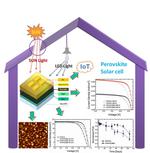Other

“The team trained people to use a robotic extra thumb and found they could effectively carry out dextrous tasks, like building a tower of blocks, with one hand (now with two thumbs). The researchers report in the journal Science Robotics …

“A single qubit on a standard silicon transistor chip has been successfully demonstrated as “quantum capable” in a new study by the UCL spinout Quantum Motion, led by researchers at UCL and Oxford University. The qubit is the building block …

“Researchers at UCL have solved a major piece of the puzzle that makes up the ancient Greek astronomical calculator known as the Antikythera Mechanism, a hand-powered mechanical device that was used to predict astronomical events. Known to many as the …

“Scientists at UCL and the IIT –Istituto Italiano di Tecnologia (Italian Institute of Technology) have created a temporary tattoo with light-emitting technology used in TV and smartphone screens, paving the way for a new type of “smart tattoo” with a …

“The quantum sensing abilities of nanodiamonds can be used to improve the sensitivity of paper-based diagnostic tests, potentially allowing for earlier detection of diseases such as HIV, according to a study led by UCL researchers in the i-sense McKendry group …

“The world’s fastest data transmission rate has been achieved by a team of UCL engineers who reached an internet speed a fifth faster than the previous record. Working with two companies, Xtera and KDDI Research, the research team led …

“Tiny diamond crystals could be used as an incredibly sensitive and small gravitational detector capable of measuring gravitational waves, suggests new UCL-led research. Predicted by Einstein’s general theory of relativity, gravitational waves are ripples in space–time generated …

““Polymers are very, very useful materials when it comes to modern applications.” Mohan Edirisinghe leads a team of researchers at University College London studying the fabrication of polymeric nanofibers and microfibers — very thin fibers made up of polymers. The group …

“Perovskite solar cells have been attracting great attention from the scientific and industrial communities in the past few years because they are able to combine high power conversion efficiencies under standard test conditions (i.e. those of the sun) with …

“Blockchain-powered computer programs promise to revolutionize the digital economy, but new research suggests they’re far from secure. Computer programs that run on blockchains are shaking up the financial system. But much of the hype around what are called smart …

